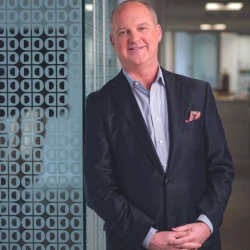
Author Speak: Brad Deutser
Truth leads to progress
According to Brad Deuster, business leaders have a unique opportunity to overcome the growing divide between managers and their employees by fostering a sense of belonging. But how? It starts with insisting on 100% of the truth, 100% of the time.
An expert in creating spaces and leadership capacity for belonging and inclusion, Brad Deutser is recognized for navigating complex, contentious, ambiguous business and people challenges inside and outside organizations. He is the visionary leader behind Deutser and the Institute for Belonging and has established leadership learning labs in Houston, New York, Bermuda, Arizona, and Austin. His unique insights and original approach to affecting a human approach to sustainable organizational change have impacted top businesses, leading universities, professional sports franchises, and cause-based organizations worldwide.
What does ‘belonging’ mean to you?
There are so many different definitions. To me, belonging is where we hold space for something of shared importance. It is where we come together on values, purpose, and identity, a space of acceptance where agreement is not required but a shared framework is understood; where there is an invitation into the space, an intentional choice to take part in, something vital to a sense of connection, security, and acceptance.
From an organizational perspective, many parts of this definition are critical yet often missing. For example, the idea that agreement is not required. So many people believe that you must agree to belong. Yet our work shows that it’s quite the opposite.
One of our rules is demanding 100% of the truth. That’s because, according to our research, most companies operate in the 80% of the truth range, which means there’s a 20% truth gap. This causes problems. It means important conversations aren’t being had. The greatest leaders and the strongest organizations are the ones who close that gap and create the space to allow these conversations to happen. They make it OK for people to re-engage in conversation in a safe way.
Why is belonging so important for organizational success?
When there’s a lack of belonging, it not only diminishes employee commitment but also engagement and satisfaction – all of which impact the bottom line.
Research shows that the workforce is speaking loudly about how critical it is to belong. One of our studies found that nine out of 10 employees believe that experiencing belonging at work is important or extremely important – more important than strategy or culture. Not only that, but people are willing to take less pay for increased belonging.
Employers don’t always need to throw more money at their employees. Just stepping back and providing a bigger conversation space can make a huge difference. Those employers that can increase belonging can get more effort from their employees and increase satisfaction, engagement, and positivity.
How can a sense of belonging help leaders with difficult conversations with colleagues?
Leaders need to have challenging conversations but often don’t know how to do it because of the sensitivity of the conversation and the challenging times in which we lead. My five rules (see box) create a framework so people can have those conversations.
Brad’s five rules that help build unity and foster performance
Here are five things that leaders must consider each and every time they make decisions for themselves and their company:
1. Turn into the power. Meet the demand for direct and intentional forays into the heart of power structures, forces, and accepted traditions.
2. Listen without labels. Hear what is spoken without judgment while engaging the unspoken with humanity and heart.
3. Choose identity over purpose. Create an ecosystem that recognizes identity’s complexity and wholeness, defining the space for inclusion.
4. Challenge everything. Promote an open environment for inquiry, free of conflict, devoid of oppositional energy and driven by a positive spirit of curiosity.
5. Demand 100% of the truth. Reject the more typical 80% of the truth in modern business and instead require 100% of the truth, 100% of the time.
A significant part of this is being very clear on our expectations. When I have a difficult conversation, for example, I am explicit that it’s not about you versus me or me beating you up or pushing you out – if I do that, I have failed as a leader. It’s about us working together to achieve a positive outcome. I may disagree with you. I may be coming to you and saying, “Hey, we have a different point of view on this.” But you’re not an adversary. We’re here together, trying to create a shared outcome.
I also encourage leaders to eliminate the ‘why’. Why did you do that? Why did you say that? Why are our numbers the way they are? Asking why creates a division at a time when we’re trying to create a connection to bring people together. Instead, I encourage leaders to invite their employees into the difficult conversation. They need to show they want to hear them. They want to set them up for success instead of setting them up for failure.
Something else that is important is where those challenging conversations are had. With this in mind, we’ve done much work to create effective office spaces. For example, we have a 100% truth table and a challenge everything table with a bunch of sticky pads for sticky conversations. By having uncomfortable conversations in these places, both people are more psychologically prepared, and we can come to a resolution much faster.
At a time when we are moving towards more hybrid ways of working, how important are workspaces when it comes to making strategic decisions?
For many companies, remote or hybrid options make perfect sense. However, we are seeing a major shift when it comes to creating a human connection. There’s a great disconnect between people and their organizations and society, leading to an epidemic of loneliness and making it difficult for managers to review performance and for people to rise through the ranks.
This needs to be addressed. We need to create what we call ‘intentional collisions’ and intentional spaces. If an organization invites their employees into a purposeful space with intention, they will find that people want to return to the office.
Can you share any tangible results that organizations have achieved having implemented your five rules?
There are so many different industries that we get to impact. We have one company that’s a leader in the aviation space. By implementing the rules, they have changed their approach to safety. It’s changed how they talk about safety and how they think about safety in an industry where the norm was seriously injuring or killing somebody every 90 days. As a result, that hasn’t happened in more than 15 years. So that’s what we’re proud of, that people – sons, daughters, moms, dads and grandparents –go home to their families.
We’ve also worked with a hedge fund in New York that decided to go against the grain and focus its business on culture and creating spaces for belonging, growth, and development. By creating a space where people want to be, they have retained their key leaders and 95% of their employees.
By implementing the rules, we see leaders change to become very human-centered – more vulnerable leaders who are more open and who are more willing to bring people into the conversation instead of shouting them down from above. What’s more, we’re seeing the workforce change for the better because of it.
BELONGING RULES: Five Crucial Actions that Build Unity and Foster Performance
Leaders have an unprecedented opportunity to overcome the great disconnect between employers and employees by inviting individuals to become part of something bigger than themselves—to belong.
In-person

Brad Deutser is the visionary leader behind Deutser and Deutser Clarity Institute (Houston, New York, Bermuda and Arizona). He is a trusted counselor, executive coach and leadership guru for CEOs, Board Chairs, and top corporate management. He is an expert in creating spaces and leadership capacity for belonging and inclusion. He is sought after as an authority and innovative thinker on organizational change, belonging, DEI, and complexity in leadership.







